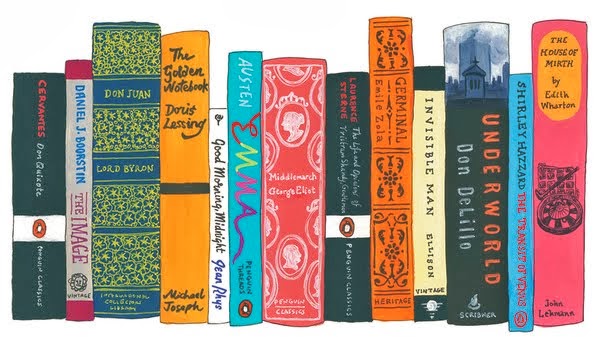
 I'm reviewing these two books together because they are so interconnected. I actually read Gilead in 2004, the year it won the Pulitzer Prize, and reread it just a few weeks ago before I started Home. Robinson's prose is a joy to read...it is consistently beautiful, graceful and spiritual. The word elegiac, I think, best describes its tone. So, if you're in the mood for something light and cheerful, these are not the books for you right now. However, if you are in a more pensive state of mind, I think you will be swept away.
I'm reviewing these two books together because they are so interconnected. I actually read Gilead in 2004, the year it won the Pulitzer Prize, and reread it just a few weeks ago before I started Home. Robinson's prose is a joy to read...it is consistently beautiful, graceful and spiritual. The word elegiac, I think, best describes its tone. So, if you're in the mood for something light and cheerful, these are not the books for you right now. However, if you are in a more pensive state of mind, I think you will be swept away.Briefly, Gilead reads almost like a sermon on living life to the fullest. The narrative flows in the form of a long letter written by the aged and dying Reverend John Ames to his young son. Since he knows he won't live to see his son grow up he wants to leave the boy with an accurate accounting of his forebears and himself. As the son and grandson of preachers he describes how his grandfather went west to Kansas to fight abolition and "preached men into the Civil War". Rev. Ames also relates his own vision of life as a "wondrously strange creation". Woven throughout his narration is also a story about the deep, complicated and often strained bonds that exist between fathers and sons.
Ames spends a good deal of time discussing his long time friend, next-door neighbor and fellow preacher, Reverend Robert Boughton. Boughton's wayward son, Jack (he was named after Rev. John Ames) returns to Gilead in an attempt to make peace with his own dying father. Jack has always been Boughton's favorite child despite his long history of thievery, meaness, drunkeness and irresponsiblity. Ames also knew Jack as a child and has never liked or trusted him. And it is clear from Ames' musings that he is anxious and fearful of what Jack's intentions might be toward his (Ames') young wife and son after he is gone from this world. The sequel, Home, provides a tender counterpoint to this notion......
The story of Home is also set in Gilead (Iowa) and runs concurrently but in Reverend Boughton's household. As I mentioned earlier, Jack, Boughton's favorite son, returns home after a 20 year absence, hoping to make peace with his father but discovers that the old man is dying. The family's youngest child, Glory had recently returned to the family home to take care of her father in his final days. Since Jack had been run out of town in disgrace while Glory was still a child, the two are now almost like strangers to each other. But as the days and weeks unfold and their father's condition continues to decline, Jack and Glory begin to forge an intense bond with each other as they slowly and painfully reveal and begin coming to terms with some of the past regrets and painful secrets that continue to haunt them. Robinson describes Jack's awkward, yet loving and tender efforts to reconcile the tattered relationship with his father in such a way that, as a reader, I began to believe that he had changed. For Boughton, however, the effort comes too late as his mind gradually slips away.
Home (and Gilead) is "about families, family secrets, and the passing of generations, about love and death and faith...an unforgettable embodiment of the deepest and most universal emotions."(inside front flap) I thought these were compelling stories...and think you will too.









